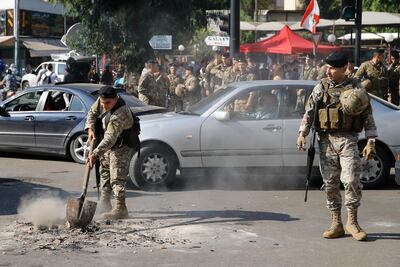The Lebanese army has arrested protesters after scuffles broke out during attempts to clear a motorway north of Beirut on the 20th day of nationwide demonstrations.
The army surrounded then forcibly moved people sitting in the middle of the Zouk Mosbeh motorway, north of the capital.
The scuffles broke out after two elderly men were found lying on the ground. Protesters said the men had been pushed over by a soldier.
The demonstrators shoved the police in response and several people blocking the motorway later said they had been beaten by the military.

The Lebanese Red Cross said an ambulance had taken a man to a medical centre and he was in a stable condition. A second man was taken to hospital after the scuffles with the army.
Human rights activist Wadih Al Asmar said dozens were detained during the scuffles north of Beirut.
The army tried to clear several roads blocked by protesters, who for nearly three weeks have been on the streets calling for the resignation of the country’s leaders.
After decades of corruption, poor government and poor provision of services, people are demanding new leadership that will introduce reforms to avert a major looming financial crisis.
Prime Minister Saad Hariri announced his resignation last week, collapsing the government, but the deliberations to elect a new head of government have not yet begun.
Many protesters are calling for a non-political technocratic administration, but politicians want to select qualified specialists who represent the various factions while allowing experts to try to solve the many crises.
But President Michel Aoun said he would not start deliberations until undisclosed stumbling blocks were overcome.
Sources have suggested that one major problem in forming a government is opposition by many parties to caretaker Foreign Minister Gebran Bassil, the president’s son-in-law, keeping his seat.
Mr Bassil has been a focal point of national anger. He and Mr Hariri met for four hours on Monday to try to resolve the foriegn minister's future.
Sources said Mr Bassil insisted that if he were not allowed into the next government, he wanted to name all of the Christian ministers, a move that would shut out the Lebanese Forces and other parties.
Also on Tuesday, Parliament Speaker Nabih Berri announced that the legislature would hold a session on November 12 to enable voting on issues such as corruption and pensions.
Mr Berri said Parliament would table other motions to meet protesters' demands in due course. The November 12 session has been delayed four times so far.
"Starting tomorrow, I will refer a number of laws to the joint committees to quickly decide on them," he told Lebanon's Daily Star newspaper.
"Deputy speaker Elie Ferzli will head three sessions a day to finish them."
Protests continued in southern Lebanon’s Sidon, with a rally outside the local office of the central bank, and in northern Lebanon’s Tripoli, where protesters closed the water authority offices.
On the road to the Lebanese American University in Byblos, students who support the Free Patriotic Movement, the party founded by Mr Aoun and now run by Mr Bassil, tried to force out other students who were blocking it.
The party issued a statement saying that it was a spontaneous move by the students and not on its orders.
In the Bekaa Valley, the Zgharta Serail municipal headquarters was blocked by sit-ins, halting much of its work.
Among the many economic and political problems the country is facing is a shortage of American dollars.
Caretaker Telecommunications Minister Mohammad Choucair on Tuesday said mobile-phone top-up cards, all priced in dollars, would now be sold to distributors in Lebanese lira.
They would be sold at the central bank exchange rate and the prices to consumers would be fixed at official rates.
Mr Choucair said that anyone selling at a higher price would be prosecuted.





















